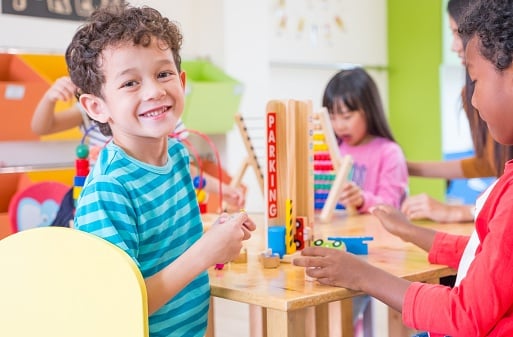Children naturally love to play. So, it just makes sense to encourage them to play games that help them to develop positive traits, ones that translate into good behavior. Sound too good to be true? Try these games that promote good behavior in preschoolers.
First, Parents.com recommends “The Cheer-Up Game,” one that helps children to develop empathy. Why is that important? According to Galina Nikolskaya, an MD and board-certified neurologist, empathy is the first core virtue in the development of morals. Subsequent core values can't be properly developed, she explains, if empathy is "not fully cultivated in the very beginning." 
So, to help develop this core value, play The Cheer-Up Game. You (meaning, the parent) simply draw a series of faces, each on its own piece of paper. One person’s face will look sad, another mad. Another might look sick and another scared. You need to draw at least as many faces as there are children in the game. Each child then chooses a piece of paper and acts out the feelings being shown in that facial expression. If the face looks angry, for example, the child might stomp around. Sad? He or she might cry. The other players then need to help the child feel better. They start by asking questions: “Why do you look so mad?” or “Why are you crying?” After the child answers, they can all role-play a solution.
You can make multiple props available for this game, helpful since it focuses largely on using the imagination. Plastic food is a good prop to provide, the article suggests (because someone may want to express empathy by preparing a snack), stuffed animals, bandages and the like.
Parents.com lists 21 more games that help develop positive traits and encourage good behavior. As just some examples, here are several games included in the article, followed by what they teach:
- Build-a-Train: perseverance
- I Spy: patience
- Mother, May I?: respect
- Balloon Bash: teamwork
- Sock Sort ‘n Toss: responsibility
PsychologyToday.com shares the value of game playing, along with tips on how to use them to help build a sense of responsibility. Because games have a goal, they motivate children to want to keep moving forward to achieve the goal. The article then shares a game you can modify in multiple ways to help your child achieve goals and contribute to the household. For example, instead of insisting your child pick up clothing and put it in the laundry basket, invite him or her to see how many baskets he or she can make by tossing the clothing into the basket. If it’s too easy, challenge your child to see how far back he or she can stand and still make the basket.
Another version of that game includes the phrase of “how long.” How long, for example, will it take everyone to be seated at the dinner table? Time them and challenge them to beat their best times. Don’t turn it into a competition between siblings, though. Instead, have your children work as a team to beat their previous record.
In any of the versions of this game, the article says, don’t ask your children if they want to play. Just start the game. Then, simply be creative and modify the game to the current situation.




